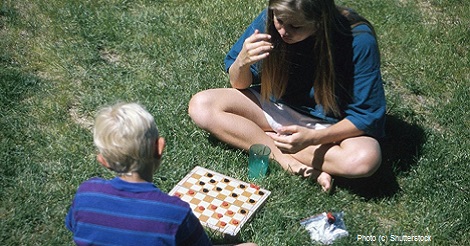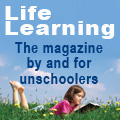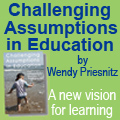|

So, What’s Fun For You?
By Bernard De Koven
It’s hard to come up with a satisfactory definition of “play.” Especially if you’re trying to find a definition that would encompass all its various meanings and usages and implications and nuances. Even both Merriam and Webster had to go to great lengths to define the word.
Equally illustrated by the dictionaries is that play is not all about fun, which makes the word even less useful – especially if you want to understand fun, and more especially if you want to understand fun so you can have more of it.
Fun, Merriam-Webster-wise, seems only slightly more easily defined. Even Google had to take an entire second to look for everything it could find about fun. Which turned out to be, according to the Google count, 1,710,000,000 references to the word “fun” – as in one billion, seven-hundred-ten million.
“Oy!” I say, as I am wont to do. Enough with the meanings and the definitions and the nuances and the theories and benefits!
And it so happens the only reason you’re thinking about the meanings of fun and play in the first place is because you happen to be wondering if it’s at all possible for you to be having maybe even a tad more fun than you’re already having.
In my many years of research into fun and how to have it, the only conclusion I have been able to draw is that it’s impossible to arrive at a satisfactorily universal definition of fun.
What’s fun for you might not be at all what’s fun for me. For you, maybe kicking a ball is fun. For me, maybe blowing bubbles. For you maybe looking for faces in the clouds, for me solitaire. And no matter how detailed I get in depicting the joys of solitaire or the very private fun to be gained when cheating – for you, solitaire is a waste of time while finding cloud faces and maybe even cloud animals is a practical pathway to paradise.
Now, the funny thing is that when I’m talking about fun, I know exactly, precisely what I mean. I know when I’m not having fun. That’s for sure. And I bet that the same is true for you.
So here’s the gist: what’s fun for me is not necessarily fun for you. How you define fun is not necessarily at all how anybody else would define fun. Although we can talk to each other about fun, when I try to understand what you mean when you say “fun” I think first about what I mean. Even if we’re talking about the same game, we are each, when talking about the fun of it, probably talking about something else.
And here’s the wisdom that I wanted to share with you:
Forget about consulting the Internet, about looking for answers in books, about seeking out experts, consulting wise people, asking your friends.
If you want to bring more fun into your life, consult yourself. Take yourself for a walk or something. Put your arm around your self’s conceptual shoulder so you feel close and easy. If your self is Jewish, you might say something like “nu, so what’s fun for you?” If not, maybe change the “nu” to “so” or “pardon me” or “yo!” Ask yourself about the fun things, the things your self thinks of as being fun.
Your self can start with anything at all that’s even mildly fun for you. How about eating? When it’s fun, what are you eating? What are you eating it with? What time are you eating? When was the last time you ate before you started eating?
With whom are you eating? Where are you eating? Get as specific, as particular, as vivid as you can about that moment of eating when eating is unquestionably, undeniably fun for you.
The truth is, your self knows what fun means. Because you know when something is fun – for you. So start there. Not with trying to define it, because you already have defined it. But with describing to yourself what you call fun – the things you do or feel or think about that you think of as fun.
Don’t waste your time looking for the things that are the most fun for you because that’s not the point. The point is that anything you think of as fun, as being fun – even if the fun is as calm as the fun of daydreaming or as intense as the fun of sky-diving – if it’s fun, it’s fun enough.
Make a list. Make a long list. Maybe even write it down. Specific things. Specific moments when those specific things seem most clearly fun. Maybe not just sky-diving. Maybe the moment, the very moment before the parachute opens. Maybe not just chewing gum, and not just any gum, and not just when you’re putting a puzzle together, and even then, not just any puzzle….
And as your list grows, and the items become more vivid, so may your understanding of what’s fun for you, so may your understanding of how and where you can find more fun, so too may you grow your appreciation for the fun in your life and of your life.
And if that doesn’t work, try playing something. Anything. And then play something else. And keep on playing and trying until you find something to play that makes you forget about the whole figuring-out-what-is-fun thing, because, finally, at last, you’re having the very thing you’re trying to find.
In 1971, Bernie De Koven completed a collection of over 1000 children’s games, organized according to different forms and complexities of social interaction. Called the Interplay Games Curriculum, and published by the School District of Philadelphia, it led to his founding of The Games Preserve, a retreat center for the exploration of games and play for adults, which functioned as a branch of The New Games Foundation. In 1978, he published The Well-Played Game, which was re-released by MIT Press in 2013. His most recent book, A Playful Path, was published the following year. He has designed games of all kinds: board and table games, computer games, social games for small and large groups, city-wide game celebrations, theater games, games for couples, families, children, and elders. But his greatest impact has been his development of a theory of fun and playfulness and how it can affect every aspect of personal and interpersonal, community, and institutional health.
Copyright © Life Media
Privacy Policy
 



|

